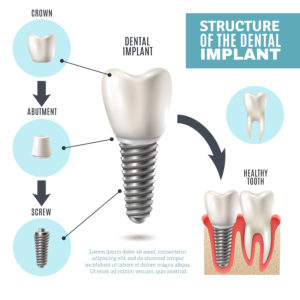
In 2018, the CDC reported that, in Michigan, a little over 71% of adults aged 18+ had visited a dentist or dental clinic within the past year. That leaves over one-fourth of Michigan residents who did not see a dentist for a 12-month period or longer.
The eventual repercussions are drastic. By the age of 65 (and over), about 32% had lost 6 or more natural teeth – again based on 2018 figures. Nationwide, the CDC reports that 26% of adults ages 65 – 74 are missing all of their natural teeth.
Severe tooth loss is defined as having 8 or fewer teeth. The CDC warns that missing teeth to this extent significantly “impacts the ability to eat meats, fruits, and vegetables, and presents yet another challenge to having a healthy diet. Certain chronic conditions are associated with severe tooth loss, which can diminish quality of life and interfere with eating healthy foods.”
Over time, complete tooth loss (edentulism) among adults aged 20-64 years has declined. By the age of 50, however, adults are missing an average of 12 teeth. And, .
Tooth loss among most states has dropped over the years, partly in thanks to fluoridation in water. Although that has helped, sugar consumption and frequent snacking has not declined.
The average U.S. adult consumes 57 lbs. of sugar a year. Partly to blame are food and beverage manufacturers. About 75% of packaged foods in the grocery store contain some form of sugar. Ingredients listed on the label can disguise these sugars, listing them as high fructose corn syrup, sucrose, glucose, dextrose and dehydrated cane juice.
The link between sugar consumption, failure to see a dentist regularly, and the onset of gum disease are indisputable. Although the dental care we provide in our Shelby Township dental office is intended to help our patients avoid problems from occurring in the first place, tooth loss can occur, especially as people age. (Tour our office at: DrBarbatOfficeTour)
With aging, gum recession exposes softer root tissue of teeth, which leads to cavities. The dentin inside the tooth can thin and crack with age. Medications and other factors affect salivary glands, so the mouth becomes dry. Oral dryness can also be accentuated by certain foods and beverages, especially those that are caffeinated.
Nearly half of American adults aged 30 years and over show signs of gum disease. Severe gum disease (periodontitis) affects about 9% of adults. The infectious, highly inflammatory bacteria of periodontitis can enter the bloodstream. It has been linked to a number of serious health problems. These include heart disease, stroke, Alzheimer’s disease, some cancers, diabetes, arthritis, impotency and more.
We prefer to work with patients to save vulnerable teeth. This may be done by placing a crown over the tooth once decay is removed. Gum contouring may also be done to reposition the seal of gum tissues around the base of the tooth. However, the majority of tooth loss prevention involves the treatment of periodontal disease.
Replacing missing teeth is important, for many reasons. The appearance of a smile is eye-catching in a negative way when a gap is present due to a missing tooth or teeth. A missing tooth can also make an individual self-conscious about smiling. Yet, from the standpoint of a neuromuscular dentist, I know the presence of teeth do much more than create a full smile.
In addition to the role of each tooth in biting, chewing, and speech, the teeth serve to support other teeth. Each tooth holds a position, which helps to keep neighboring teeth in their positions. A tooth’s position is supported by the teeth on either side as well as the one above or below, helping to also keep it at a proper height.
Maintaining proper position has a great deal to do with how your overall bite impacts your entire facial structure. The TMJ (temporomandibular joints) hinge your lower jaw to the skull. These joints are in constant motion, moving each time you eat and speak. Ease of function in these joints requires a delicate balance. Even minute disparities in bite alignment can cause stress or strain on the jaw joints.
Losing a natural tooth also places neighboring teeth at risk for loss when not replaced. The open gap causes higher risk for loss as it becomes more vulnerable to decay, breaks, and gum disease.
Studies have shown that missing teeth greatly influences the perception of others, indicating indicated that missing teeth create barriers to personal and social success. In one study, college-aged students rated photographs of people smiling. The photos ranged from those clearly having all their teeth to those missing as many as four upper teeth.
Each photo was rated on attractiveness, health, education, satisfaction with life, active social life, aggressiveness, intelligence, trustworthiness, friendship, potential of dating, and how likely they would be to have as a neighbor.
In all social traits, those who had missing teeth were more negatively perceived with the most negative ratings when considering having a personal connection to the individual (such as going on a date or having as a neighbor).
If you have missing teeth or are unhappy with your current replacement option (whether in appearance or function), we offer exceptional replacement choices…
Dental Implants – Implants do not require the crowning of adjacent teeth for support. Each implant is positioned in the jaw bone, providing the same, sturdy foundation like that of natural teeth. Relying on neighboring teeth to help support a bridge of replacement teeth is not necessary.
Dental Implants aid in the prevention of a shrinking jaw bone by restoring the presence of tooth roots in the jaw bone. This helps to preserve bone mass by halting the process of “resorption,” which is similar to a decline of bone mass.
A single implant can often support more than one tooth. In many cases, a bridge of two or three teeth can be dependably attached. A full arch of teeth can often be supported by just 6 or 8 strategically placed implants. Because the fees associated with dental implant treatment are based on the number of implants placed, this helps to minimize overall costs. Dental implants are the closest thing to the look, feel and function of natural teeth. They restore confidence when speaking, laughing, eating and even sneezing!
A dental implant will never get a cavity, need a root canal or have detrimental effects on surrounding teeth. Additionally, the success rate of implants is excellent – up to 98 percent; higher than any other implant-in-bone success rate. With proper care, dental implants should last your lifetime, making them a wise investment.
The placement process for implants is performed while the patient enjoys complete comfort. In our Shelby Twp dental office, the procedure is done while the patient relaxes with oral sedation or I.V. sedation (“twilight sleep”).
In our comfortable Macomb County dental office, we provide all stages of implant treatment in one convenient location. And, we adhere to advanced protective measures for your safety throughout each step – from diagnosis to placement to the placement of your beautiful porcelain restorations (replacement teeth).
Crown & Bridge – By crowning a natural tooth on each side of an area where teeth are missing, a ‘bridge‘ of one, two, or several replacement teeth can be securely held. This restores a natural look and feel through crowns made of porcelain. Porcelain is one of the most durable, stain-resistant materials used in dentistry and provides exceptional longevity.
Precision-Fitted Partials – A ‘partial’ refers to a partial denture. These are primarily used to replace back or side teeth when there are remaining natural teeth onto which they can be attached. In our Shelby Township dental office, we create partials to interact properly with surrounding teeth. This provides dependable chewing that fits harmonious with proper bite alignment. The comfort and longevity of your partial will be to an excellent level and made to blend naturally with existing teeth.
Full Dentures – A full denture is typically removable (unless supported by dental implants) and replaces all teeth as well as gums that have diminished in height. New denture wearers need time to get accustomed to their new “teeth” because even the best fitting denture can feel awkward at first. Some have difficulty eating for several days or weeks and may notice a slight change in facial appearance, increased salivary flow, or minor speech difficulty.
As with partial dentures, disadvantages also include a more rapid rate of bone loss (due to the pressure from the denture on the underlying bone). This leads to the need for occasional “relines” to reshape the denture so it conforms to the declining arch.
As the arch shrinks, there is also the potential for slips, which can lead to embarrassment and difficulty eating some foods.
Many people do not like the need to remove their dentures at night to soak them. They also worry about bad breath from bacteria build up in the porous material that makes up the denture’s base.
Cosmetic Dentures – In creating an upper denture for patients, we can incorporate measures to provide a ‘lift’ of facial muscles while smoothing out wrinkles around the mouth. This is done through careful construction of the height of the gum base. By extending its height, facial sags and wrinkles can be plumped up and out for a more-youthful appearance. We use advanced materials so the teeth and the gums provide you with a look and feel no one would ever guess is anything but your own beautiful, natural smile!
As a neuromuscular dentist, our patients benefit by these special skills in the proper placement of the teeth attached to the implants. With over 300 hours of advanced training, I am able to incorporate measures for proper bite alignment. Through this, your replacement teeth interact harmoniously with adjacent teeth. (Allow me to introduce myself at: DrBarbatIntro)
For people who prefer a crown & bridge combination, these skills are also beneficial. With this option, we secure a ‘bridge’ of two or several replacement teeth, securely and properly aligned. Your final replacement crowns, bridge or implant ‘restoration’ teeth will be made of porcelain. Porcelain is one of the most durable, stain-resistant materials used in dentistry. This gives you a smile that has natural appeal and is created to provide the beautiful smile you’ve always wanted.
In our Macomb County dental office, we provide all phases of Dental Implants in one location. Here, we make patient comfort a priority at every appointment, including total relaxation through Oral Sedation or I.V. Sedation (“twilight sleep”). (View a brief video on sedation at: DrBarbatSedation)
To help you achieve your oral health goals, flexible payment plans are available. These options can allow you begin treatment immediately and pay in easy monthly amounts that are manageable to most budgets. Most plans require no down payment and are interest free. Our Financial Coordinator will gladly discuss these options with you in more detail.
Regardless of your choice of tooth replacement, our dental office will surround you with some of the most advanced technology available in dentistry. You’ll be cared for by a team of skilled professionals, each fully commitment to respectful, compassionate care. We take great pride in the positive experience our patients know they’ll have.
Call 586-739-2155 or tap here to schedule a free consultation. We are happy to discuss your preferences in tooth replacement or any oral health need during this time.
Sources:
https://thehill.com/changing-america/well-being/longevity/469907-the-average-american-eats-57-pounds-of-sugar-every-year/#:~:text=The%20average%20adult%20in%20the,pounds%20of%20sugar%20a%20year.
https://nccd.cdc.gov/oralhealthdata/rdPage.aspx?rdReport=DOH_Data.ExploreByLocation&rdProcessAction=&SaveFileGenerated=1&islLocation=26&rdICL-iclTopic=ADT&iclTopic_rdExpandedCollapsedHistory=&iclTopic=ADT&islYear=2018&hidLocation=26&hidTopic=ADT&hidYear=2018&irbShowFootnotes=Show&rdICL-iclIndicators=ADT1_1%2cADT1_3%2cADT1_4&iclIndicators_rdExpandedCollapsedHistory=&iclIndicators=ADT1_1%2cADT1_3%2cADT1_4&hidPreviouslySelectedIndicators=&DashboardColumnCount=2&rdShowElementHistory=&rdScrollX=0&rdScrollY=0&rdRnd=55867
https://www.health.harvard.edu/diseases-and-conditions/the-aging-mouth-and-how-to-keep-it-younger